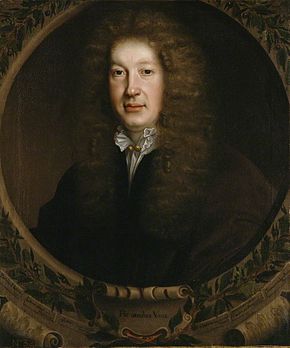To The Earl Of Roscommon, On His Excellent Essay On Translated Verse. Poem Rhyme Scheme and Analysis
Rhyme Scheme: AABBCDEEAAFFGHIJKLMM NNNOOEPQQRRSTTUUVVWW XYZZA2A2BBUUB2B2C2C2 D2D2E2E2 STF2G2H2I2E2E2E2J2J2 K2L2K2RRMMM2M2| Whether the fruitful Nile or Tyrian shore | A |
| The seeds of arts and infant science bore | A |
| 'Tis sure the noble plant translated first | B |
| Advanced its head in Grecian gardens nursed | B |
| The Grecians added verse their tuneful tongue | C |
| Made Nature first and Nature's God their song | D |
| Nor stopp'd translation here for conquering Rome | E |
| With Grecian spoils brought Grecian numbers home | E |
| Enrich'd by those Athenian Muses more | A |
| Than all the vanquish'd world could yield before | A |
| Till barbarous nations and more barbarous times | F |
| Debased the majesty of verse to rhymes | F |
| Those rude at first a kind of hobbling prose | G |
| That limp'd along and tinkled in the close | H |
| But Italy reviving from the trance | I |
| Of Vandal Goth and Monkish ignorance | J |
| With pauses cadence and well vowell'd words | K |
| And all the graces a good ear affords | L |
| Made rhyme an art and Dante's polish'd page | M |
| Restored a silver not a golden age | M |
| Then Petrarch follow'd and in him we see | N |
| What rhyme improved in all its height can be | N |
| At best a pleasing sound and fair barbarity | N |
| The French pursued their steps and Britain last | O |
| In manly sweetness all the rest surpass'd | O |
| The wit of Greece the gravity of Rome | E |
| Appear exalted in the British loom | P |
| The Muses' empire is restored again | Q |
| In Charles' reign and by Roscommon's pen | Q |
| Yet modestly he does his work survey | R |
| And calls a finish'd Poem an Essay | R |
| For all the needful rules are scatter'd here | S |
| Truth smoothly told and pleasantly severe | T |
| So well is art disguised for nature to appear | T |
| Nor need those rules to give translation light | U |
| His own example is a flame so bright | U |
| That he who but arrives to copy well | V |
| Unguided will advance unknowing will excel | V |
| Scarce his own Horace could such rules ordain | W |
| Or his own Virgil sing a nobler strain | W |
| How much in him may rising Ireland boast | X |
| How much in gaining him has Britain lost | Y |
| Their island in revenge has ours reclaim'd | Z |
| The more instructed we the more we still are shamed | Z |
| 'Tis well for us his generous blood did flow | A2 |
| Derived from British channels long ago | A2 |
| That here his conquering ancestors were nursed | B |
| And Ireland but translated England first | B |
| By this reprisal we regain our right | U |
| Else must the two contending nations fight | U |
| A nobler quarrel for his native earth | B2 |
| Than what divided Greece for Homer's birth | B2 |
| To what perfection will our tongue arrive | C2 |
| How will invention and translation thrive | C2 |
| When authors nobly born will bear their part | D2 |
| And not disdain the inglorious praise of art | D2 |
| Great generals thus descending from command | E2 |
| With their own toil provoke the soldier's hand | E2 |
| - | |
| How will sweet Ovid's ghost be pleased to hear | S |
| His fame augmented by an English peer | T |
| How he embellishes his Helen's loves | F2 |
| Outdoes his softness and his sense improves | G2 |
| When these translate and teach translators too | H2 |
| Nor firstling kid nor any vulgar vow | I2 |
| Should at Apollo's grateful altar stand | E2 |
| Roscommon writes to that auspicious hand | E2 |
| Muse feed the bull that spurns the yellow sand | E2 |
| Roscommon whom both court and camps commend | J2 |
| True to his prince and faithful to his friend | J2 |
| Roscommon first in fields of honour known | K2 |
| First in the peaceful triumphs of the gown | L2 |
| Who both Minervas justly makes his own | K2 |
| Now let the few beloved by Jove and they | R |
| Whom infused Titan form'd of better clay | R |
| On equal terms with ancient wit engage | M |
| Nor mighty Homer fear nor sacred Virgil's page | M |
| Our English palace opens wide in state | M2 |
| And without stooping they may pass the gate | M2 |
John Dryden
(1)
Poem topics: , Print This Poem , Rhyme Scheme
Submit Spanish Translation
Submit German Translation
Submit French Translation
<< Songs In "the Conquest Of Granada." Poem
Heroic Stanzas On The Death Of Oliver Cromwell, Written After His Funeral. Poem>>
Write your comment about To The Earl Of Roscommon, On His Excellent Essay On Translated Verse. poem by John Dryden
Best Poems of John Dryden
